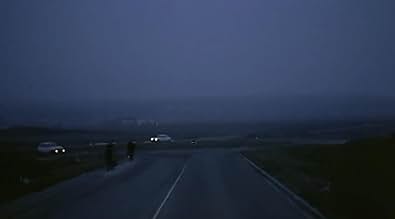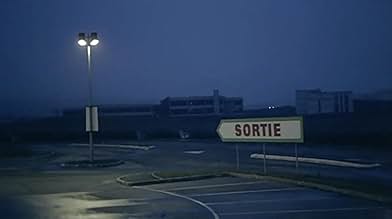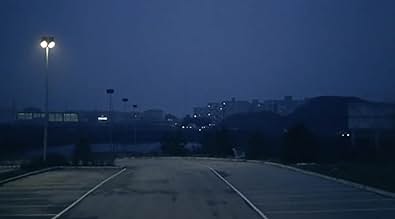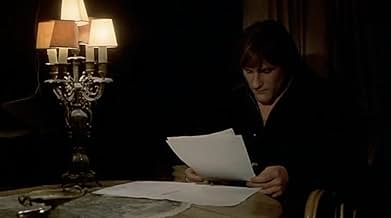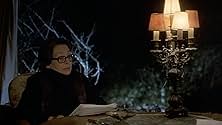Füge eine Handlung in deiner Sprache hinzuA female writer reads a script to her future performer. A script still in the making, as little by little the images come to life and the characters take shape.A female writer reads a script to her future performer. A script still in the making, as little by little the images come to life and the characters take shape.A female writer reads a script to her future performer. A script still in the making, as little by little the images come to life and the characters take shape.
- Regie
- Drehbuch
- Hauptbesetzung
- Auszeichnungen
- 1 Nominierung insgesamt
Empfohlene Bewertungen
I know Marguerite Duras is famous, but The Lorry is one of the most boring movies I've ever sat through. I wonder if even her biggest fans enjoyed this one. Perhaps they did, since they got to pretend they were hanging out in her living room while she spitballed her next story idea.
When I tell you that nothing happens in this movie, it's actually true. For eighty minutes, Marguerite sits at a table in her home and talks about a movie she's going to make. Sometimes she reads aloud passages from the script and sometimes she just talks about her vision for what would happen. Sometimes the film cuts to exterior shots of the open road, since her would-be movie is about a hitchhiker in a truck. Sometimes there are long silences. Sometimes her one-person audience, Gérard Depardieu, asks a question. Sometimes he just sits there and turns the page of the script. If you have insomnia and sleeping pills don't work, put this movie on for ten minutes. It worked for me several times.
When I tell you that nothing happens in this movie, it's actually true. For eighty minutes, Marguerite sits at a table in her home and talks about a movie she's going to make. Sometimes she reads aloud passages from the script and sometimes she just talks about her vision for what would happen. Sometimes the film cuts to exterior shots of the open road, since her would-be movie is about a hitchhiker in a truck. Sometimes there are long silences. Sometimes her one-person audience, Gérard Depardieu, asks a question. Sometimes he just sits there and turns the page of the script. If you have insomnia and sleeping pills don't work, put this movie on for ten minutes. It worked for me several times.
Marguerite Duras said, "I approach cinema with the intention to murder it." "Le Camion" is irrefutable evidence of her criminal intent. John Waters called "Le Camion" an example of truly experimental cinema because it is the absolute antithesis of anything remotely commercial. Released the same year as "Saturday Night Fever," it would be a sign of insanity to consider pairing "Le Camion" with it on a double-bill. Duras' film consists of endless shots of a blue truck driving through industrial sectors of the French suburbs, edited with the jaded-looking, chain-smoking director commenting on a script (that is never actually shot) to actor Gerard Depardieu. There is plenty of time to contemplate Duras' bracelets, wristwatch and her home decor, as well as what you might do once you're finally let out of the theater. An interior shot of the truck's upholstered bucket seats actually stuns the audience as if it were a moment of high-intensity drama. Eighty minutes long, the film actually seems much longer; in fact, it seems to take days. Oddly, it held me in a trance-like state for its duration. For his part, Depardieu -- constantly upstaged by the passive-aggressive Ms Duras -- looks bemused and feeds his co-star a lot of questions, which she answers with dismissive grandiosity, all of which is aimless. She talks about the script -- a story of a male truck-driver and an older, female hitchhiker, and their conversations, which are political, humanitarian, philosophical and all complete twaddle -- as if she has all the time in the world, and so do you. There may be something existential intended or it may, as I suspect, all be drivel. In any event, there is no question MD succeeds in strangling the life out of the cinema -- very slowly. Not to be missed, and unlikely you will want to see it twice. As Waters pointed out, introducing the film at Alliance Francaise in New York in February 2006, this film was never released on VHS and is unlikely to show up anytime soon on DVD.
It divided the critics when it was shown at the Cannes Festival although it obtained the surprising endorsement of Pauline Kael.Duras' cinema usually is light in plot and incident but here she takes her usual style to an extreme of minimalism.In a dark room the woman(Duras) and the man (Depardieu)talk for about eighty minutes. The woman talks about the film which she would have made,a film about a woman who hitches a ride with a truck driver ,coincidentally perhaps a film not unlike the minimalist "Je tu il elle" by another feminist director Chantal Akerman. Spliced between these conversations are shots of a truck driving through endless Parisian suburbs,a landscape which has a certain bleak industrial beauty.It becomes clear that Duras is both the writer/director and the woman who is hitching the ride while Depardieu is both the actor and the truck driver and between the two settings, the interior of the script and the exterior where it would be played out a film,struggling to find expression,is born in the imagination of the receptive viewer.
Intellectually explosive material here from Duras, which got her booed at Cannes. Highly feminist without providing any signposting as such. I guess a point is that a lorry driver and a millionaire, are both men, and this similarity brings them closer together than a man and a woman. Both a communist and a capitalist fixate on the material. Karl Marx and Adam Smith are both men. Marguerite Duras hopes you are very angry reading this.
OK, so what set of images and sounds do we have here? We have two types of scenes, either scenes of a blue lorry amongst industrial sprawl, or Marguerite Duras herself and Gerard Depardieu talking through a script about a hitch-hiker and a lorry driver. Duras' modus operandi with many of her films is to get you to see the real images of the film in your head, with the actual images on the screen merely your facilitator. You are to complete the story (as when you read a book). As it is, even this is difficult as the physical progress of the story is monotonous, however we are free to luxuriate and terrify ourselves in the simple yet sublime task of imagining the ocean, for example.
Collusion between classes is hinted at, a pact to mutilate our true selves. Dismayed talk about children being trained to be less personal foreshadows a later work, Les Enfants.
The images from Bruno Nyutten are almost paradoxically beautiful, how can the devastated countryside soothe the eyes so much? Rows of spindly leafless trees benefit from the accompanying Diabelli variations, and magic hour filming works its magic.
Pauline Kael famously spent two paragraphs dismissing Star Wars and seven paragraphs analysing Le camion, all within the same article around the time both were released (there also followed seven paragraphs on the prison film Short Eyes). Marguerite reveals herself in the film as quite the bright-eyed wampyr, disdainful of the patriarchy. Certainly she deserves triple and then some the attention of Star Wars.
This film is a punishment for being your conditioned self, or a billet-doux. Choose.
OK, so what set of images and sounds do we have here? We have two types of scenes, either scenes of a blue lorry amongst industrial sprawl, or Marguerite Duras herself and Gerard Depardieu talking through a script about a hitch-hiker and a lorry driver. Duras' modus operandi with many of her films is to get you to see the real images of the film in your head, with the actual images on the screen merely your facilitator. You are to complete the story (as when you read a book). As it is, even this is difficult as the physical progress of the story is monotonous, however we are free to luxuriate and terrify ourselves in the simple yet sublime task of imagining the ocean, for example.
Collusion between classes is hinted at, a pact to mutilate our true selves. Dismayed talk about children being trained to be less personal foreshadows a later work, Les Enfants.
The images from Bruno Nyutten are almost paradoxically beautiful, how can the devastated countryside soothe the eyes so much? Rows of spindly leafless trees benefit from the accompanying Diabelli variations, and magic hour filming works its magic.
Pauline Kael famously spent two paragraphs dismissing Star Wars and seven paragraphs analysing Le camion, all within the same article around the time both were released (there also followed seven paragraphs on the prison film Short Eyes). Marguerite reveals herself in the film as quite the bright-eyed wampyr, disdainful of the patriarchy. Certainly she deserves triple and then some the attention of Star Wars.
This film is a punishment for being your conditioned self, or a billet-doux. Choose.
The relationship between film and narrative severed-or alternatively reinforced. Duras reads a script to Gerard Depardieu in her house. The script describes the scenario for an imaginary film in which a woman hitches a ride on a truck by the sea and launches into a monologue-with occasional interdictions, responses, questions from the (male) driver-sometimes closing her eyes and launching into song, observing the landscape (apparently inaccurately), hinting at stories, providing vague hints of a family connection (the birth of her daughter's child), a love affair, her disillusionment with the present state of Marxist politics, the complicity of the proletariat's official representatives with those of the power structure they ostensibly seek to overthrow, 'ruin' the only politics. Duras describes this in the conditional tense-this is what she would have said if we had made this film-yet this description is itself scripted, everything under a tight control belying the vagueness, the dissolution, the aimlessness imparted by dialogue and scenario. Depardieu's questions seem, too, to be scripted, his and Duras' eyes fleeting downwards to the pages of script they held even when the dialogue appears spontaneous. They are not the female passenger and the male driver, but of course they cannot not be read as analogues. As in 'Le Navire Night', in which the focus on settings, costumes, the process of make-up, are disconnected from any dramatized acting of the scenarios described, film becomes a record of narration rather than an embodiment of what's narrated; but as one critic points out, perhaps this makes 'Le Camion' more truly a 'narrative film' than any conventional film narrative.
The film cuts between Duras and Depardieu, filmed in one setting at night, in another at dusk; between shots, filmed from a moving vehicle, of the landscape-factories, lorry parks, the edges of towns constituting neither the urban built environment nor the rural; spaces of transport and passage-and shots of the titular blue lorry travelling through it, Beethoven's Diabelli Variations intermittently coming and going as if on the truck's radio. Duras notes in her script that the film could be shot in various different locales-all of them outside the metropolitan centre, through-spaces, neglected spaces, a 'land of migrants'. As such, they destabilise notions of national belonging, of the power relations read into landscape, while suggesting the fate of the economic periphery, that to the side of dominant narratives, in a manner far removed from the conventional representational framings of social realism, cinema verité, and the like. Like the room in which Duras and Depardieu read, the script describes the lorry's cabin as both darkroom and prison, safe house and space of incarceration. "I feel as though you and I, too, are threatened by the same light that they are frightened of; the fear that all of a sudden the lorry's cab, this darkroom, may be flooded by a stream of light, you see...The fear of a catastrophe: political intelligence /understanding." Is that fear the fear of political intelligence, or is its fear political intelligence in itself? What might this catastrophe be, insulated but constantly on the move? Is this even all an extended metaphor for the 'fellow traveller'? The film that would have been-yet which, in its rehearsal, retelling, conjectural description, is a film-is that stand in for the idea of revolution, of a non-derailed, non-betrayed communism that refuses compromises with the established order, in what Duras describes as a bargain between capitalism and socialism, "the infinite delay of any free revolution".
"Several explanations would have been possible".
The film cuts between Duras and Depardieu, filmed in one setting at night, in another at dusk; between shots, filmed from a moving vehicle, of the landscape-factories, lorry parks, the edges of towns constituting neither the urban built environment nor the rural; spaces of transport and passage-and shots of the titular blue lorry travelling through it, Beethoven's Diabelli Variations intermittently coming and going as if on the truck's radio. Duras notes in her script that the film could be shot in various different locales-all of them outside the metropolitan centre, through-spaces, neglected spaces, a 'land of migrants'. As such, they destabilise notions of national belonging, of the power relations read into landscape, while suggesting the fate of the economic periphery, that to the side of dominant narratives, in a manner far removed from the conventional representational framings of social realism, cinema verité, and the like. Like the room in which Duras and Depardieu read, the script describes the lorry's cabin as both darkroom and prison, safe house and space of incarceration. "I feel as though you and I, too, are threatened by the same light that they are frightened of; the fear that all of a sudden the lorry's cab, this darkroom, may be flooded by a stream of light, you see...The fear of a catastrophe: political intelligence /understanding." Is that fear the fear of political intelligence, or is its fear political intelligence in itself? What might this catastrophe be, insulated but constantly on the move? Is this even all an extended metaphor for the 'fellow traveller'? The film that would have been-yet which, in its rehearsal, retelling, conjectural description, is a film-is that stand in for the idea of revolution, of a non-derailed, non-betrayed communism that refuses compromises with the established order, in what Duras describes as a bargain between capitalism and socialism, "the infinite delay of any free revolution".
"Several explanations would have been possible".
Wusstest du schon
- WissenswertesMarguerite Duras's debut as an actress and she also wrote and directed this film.
- VerbindungenEdited into Passage des arts: Marguerite Duras, l'écriture et la vie (2021)
- Soundtracks33 Veränderungen über einen Walzer von A. Diabelli op 120
Written by Ludwig van Beethoven
Top-Auswahl
Melde dich zum Bewerten an und greife auf die Watchlist für personalisierte Empfehlungen zu.
Details
- Laufzeit1 Stunde 16 Minuten
- Sound-Mix
- Seitenverhältnis
- 1.66 : 1
Zu dieser Seite beitragen
Bearbeitung vorschlagen oder fehlenden Inhalt hinzufügen


